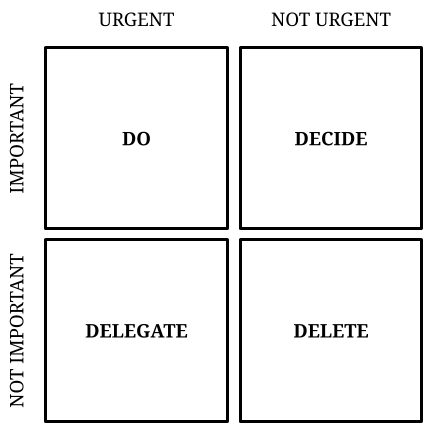Four Tips for Effective Time Management at Your Tech Job
Time management is the translation of your high-level goals to the calendar blocks filling up your day. Tips include planning your week, adding do not disturb, and more.

It’s no revelation that tech is an industry where projects, deadlines, and environments are constantly changing and adapting to new developments. Consequently, effective time management is not just a skill but a crucial necessity. The art of time management can be the distinguishing factor between success and stress, productivity and burnout. Below, we’ve offered tools and tips which aim to equip tech workers with strategies to navigate the complex terrain of time management with ease.
Understanding the Essence of Time Management
The concept of time management, especially in tech, transcends the act of simply keeping a to-do list or a strict schedule. Instead, it’s about identifying what is truly important in your professional life and aligning your work accordingly. The primary step towards this is setting clear, achievable goals. What is your overarching objective in your current role or project? Identifying this 'Top Goal' provides a focal point around which all other tasks should revolve
When it comes to setting goals, clarity is key. A vague or ambiguous goal is like trying to hit a target blindfolded. Clear goals provide direction and a sense of purpose. In tech, goals might revolve around successful product launches, efficient team performance, effective market penetration, or effective and innovative code. Once the goals are identified, the next step is prioritization: evaluating the impact of various tasks and focusing on those that align most closely with your main objectives. Simply, time management is the translation of your high-level goals to the calendar blocks filling up your day.
The Eisenhower Matrix: A Tool for Prioritization
A practical tool to assist in this prioritization process is the Eisenhower Matrix. This framework helps in categorizing tasks into four quadrants based on urgency and importance:

- Important and Urgent: Tasks that require immediate attention. For a product manager, this could be building out a deck to present the product roadmap.
- Important but Not Urgent: Tasks that are important, but can wait to be completed. Think: a software developer planning for refactoring to improve code quality, or a product marketing manager strategizing a future campaign.
- Urgent but Not Important: Tasks that demand attention but aren’t critical to long-term goals. This could be as simple as preparing for a meeting you were looped into at the last minute.
- Neither Urgent nor Important: Low-priority tasks that offer little value, such as administrative tasks (that can often be automated!)
The key takeaway from the Eisenhower Matrix is focusing on the 'Important but Not Urgent' quadrant. These are the tasks that contribute significantly towards achieving your long-term goals but often get neglected in the daily hustle. For more tips on prioritization, check out this post on The Merit Blog.
Four Tips for Effective Time Management
The concept of a "Good Day" in the tech world is one where you achieve deep, uninterrupted focus, leading to significant progress in your work. The GitHub Good Day Project underscores the importance of such days and how to attain them. Here are some key strategies:
Tip 1: Plan your week, not just your day
While many professionals plan their days, exceptional time management involves thinking longer-term. Planning your week provides a broader perspective, enabling you to allocate time more strategically and identify blocks for deep, focused work. This shift from a daily to a weekly focus helps in balancing immediate demands with longer-term goals.
Tip 2: Find your most productive time
Each individual has a unique rhythm to their productivity, especially for tasks like complex coding or roadmapping. Some find their peak performance in the early hours, while others might be night owls. Pinpoint these periods and guard them for tasks that require the highest concentration.
Tip 3: Put yourself in “Do Not Disturb” for 20% of your week
Famously, Google encourages its employees to spend 20% of their week (that’s one whole day!) working on projects that most benefit… Google. These could be side explorations or focused work — anything that helps the company and its initiatives advance. Take a page out of their book and block out your calendar with “no meeting” times or “do not disturb” statuses on your chat channels. Similarly, batch your work into related tasks over these time blocks, so that you can wholly commit to a certain theme — decreasing your transition time. And during these blocks, avoid all non-essential distractions like emails, social media, or casual browsing.
Properly communicating your schedule is critical, too. When your colleagues understand your work pattern, they’re more likely to respect your time blocks, enabling more effective collaboration. In fact, it can take over 20 minutes to fully regain deep focus after an interruption; so reducing the frequency and duration of interruptions can drastically improve productivity.
Tip 4: Reflect and plan at the end of each day
End each day with a reflection on what you accomplished, what lessons you learned, and what could be improved. Use your reflection to build out a skeleton for the next day. Don’t consider this an “assignment” but rather a few minutes (even just five!) to round out your to-do list and prepare for what’s to come — ensuring a continuous loop of learning, improvement, and ultimately, efficiency.
This also helps to set realistic expectations and acknowledge the effort put into tasks, even if the outcomes aren't as expected. Regular reflection on your workday can provide insights into your work patterns and help in tweaking strategies for better productivity.
Tools for Time Management
In the digital age, numerous tools and apps can assist in managing your time effectively. Here are a few:
Basic
- Notion: An intuitive and organized way to keep track of your notes and to-do’s.
- Clockwise: Especially helpful for managers to find collective meeting times without disrupting deep work periods.
- Jira or Asana: Useful for developers and managers to track progress on projects.
Advanced:
- Site Blockers: Use these to disallow yourself from accessing distracting websites, whether it be social media, someone’s blog, or anything else that drains your focus.
- Rescuetime or Motion: Helpful for all roles, particularly developers and PMs to analyze where their time is spent and optimize their schedules.
Taking Control of Your Time
By setting clear goals, prioritizing tasks, planning ahead, focusing on productivity, and leveraging the right tools, you can take command of your time. In an industry and career where change is the only constant, adapting and fine-tuning these skills to suit your evolving roles and responsibilities is key; and when done strategically, time management becomes an engine for innovation and excellence.
Connect with mentors on Merit across various roles in tech to get insights and suggestions about effective time management and more:
